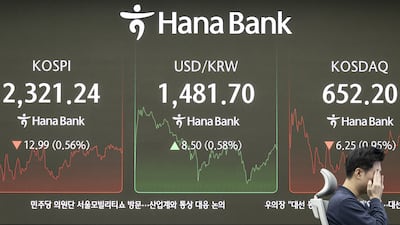Asian stocks fell along with oil prices on Wednesday as US tariffs, including 104 per cent duties on Chinese goods, took effect for about 60 countries and President Donald Trump increased pressure on Beijing.
Japan's Nikkei index closed 3.1 per cent lower, while most other markets in the region also fell following Tuesday's rebound.
South Korea's Kospi fell 1.50 per cent and stocks in Taiwan sank further into bear territory, plummeting 5.69 per cent.
“Hopes of seeing Donald Trump roll back tariffs before they go live were dashed this morning – along with sentiment across global financial markets,” Ipek Ozkardeskaya, senior analyst at Swissquote Bank, said.
“I won’t say much about yesterday’s rebound: moves of that magnitude – above 2 to 3 per cent – aren’t sustainable unless there’s a clear resolution to the tariff problem.”
On Monday, Mr Trump threatened China with a 50 per cent additional duty if it did not drop its 34 per cent retaliatory tariff, which matched the levies he imposed on Beijing last week. China on Tuesday pledged to “fight to the end”, calling the escalation of tariffs “a mistake on top of a mistake”.
However, stocks in Hong Kong and China's main equity measure, the Shanghai Composite Index, swung from early losses to end the day with small gains. Hong Kong's Hang Seng Index moved 0.81 per cent higher, adding to a 1.48 per cent rise on Tuesday. Stocks in China ended trade with a gain of 1.16 per cent over expected support measures from the government, after the sovereign investment fund Central Huijin instructed state-owned companies to prop the market with share purchases.
China's vow to “fight to the end” probably includes “massive and unprecedented” measures to keep the economy afloat, including letting the yuan weaken to absorb part of the tariff cost, Ms Ozkardeskaya said.
The yuan dropped to its lowest levels since 2007 on Wednesday morning. “Expect rate cuts, liquidity injections and other measures to follow, one after the other, as China digs in,” she added.
India’s BSE Sensex Index dropped 0.75 per cent and Australia’s S&P/ASX 200 fell 1.32 per cent.
Not all Asian nations are retaliating against Mr Trump's levies. South Korea's acting president Han Duck-soo told CNN on Tuesday that his government will not fight against the 25 per cent tariffs announced. These could hit the country's export-led economy that sells brands such as Samsung, LG and Hyundai to American consumers.
“I think we should, in a very cool way, assess what this 25 per cent means for us, and we should, in a very cool way, negotiate with them,” Mr Han told CNN, adding that he had dispatched his trade minister to Washington.
Analysts expect global equity markets to remain volatile, with widespread selling pressure.
In the Middle East, the stock markets painted a mixed picture. The Dubai Financial Market General Index closed 0.05 per cent down, while Abu Dhabi's stock exchange gained 1.14 per cent. Saudi Arabia’s benchmark Tadawul Index closed trading at a loss of 1.82 per cent.
The Kuwait bourse was up 0.29 per cent and Bahrain closed down 0.16 per cent, while Qatar Stock Exchange climbed 0.08 per cent.
Oil market weakness
Oil prices, meanwhile, have continued their slide, nearing levels seen during the pandemic five years ago, on concern that retaliatory tariffs between China and the US could lead to a global trade war and hurt economic growth.
Brent, the benchmark for two thirds of the world’s oil, slipped 6.34 per cent to $58.84 per barrel at 4.15pm UAE time. West Texas Intermediate, the gauge that tracks US crude, was down 6.68 per cent to $55.60 per barrel.
The trade shock, darkening economic prospects and spiking uncertainty are pressuring commodity prices, Julius Baer said in a note on Wednesday as it trimmed its oil forecast.
"Oil may trade around, if not below, $60 going forward, while safe-haven demand is adding a cyclical boost to gold’s central-bank-buying-driven record run," it said.
The oil market has been hit by a double whammy: the souring economy and the latest twists in oil politics as the "petro-nations announced plans to accelerate supply hikes next month" in a surprise move, which come on top of a deteriorating demand outlook, the bank said in a research note.
"We have trimmed our projections for oil demand and believe that US oil production and exports will become the main victims of rising global supplies and intensified competition for market shares. Both world oil demand and US shale output head for stagnation, if not decline, ending the US oil supremacy. Our view of an oil market heading into surplus seems confirmed."
Julius Baer maintained its 'Neutral' view but has cut its price forecasts to $60 per barrel on both a three-month and 12-month horizon.
The US has raised the average tariff rate on US imports from 2.5 per cent to 24 per cent – levels not seen since the 1930s and 1940s. Some analysts are predicting that a trade war will push the global economy into recession.
“These sharp increases [in tariffs] are expected to weigh on trade and economic activity globally, heightening uncertainty around the outcome of any forthcoming negotiations. The current environment also raises the risk of recession across major economies, including the US,” UBP said in its latest report.
Billionaire Ray Dalio, founder of hedge fund Bridgewater Associates, raised the alarm, saying the world is seeing a “classic breakdown” of the major monetary, political and geopolitical orders.
“This sort of breakdown occurs only about once in a lifetime, but they have happened many times in history when similar unsustainable conditions were in place,” he said in a post on X.




